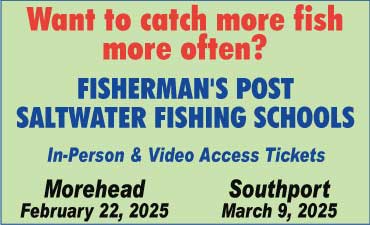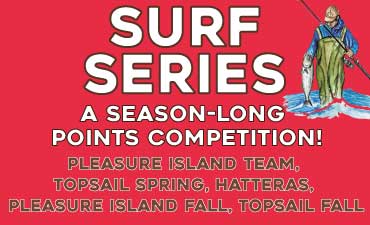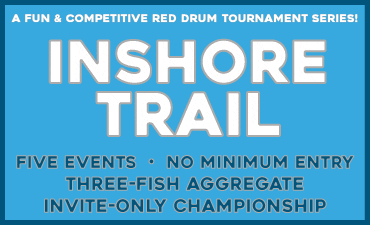Releases – July 14, 2011
The N.C. Division of Marine Fisheries declared summer flounder “viable” in its 2011 Stock Status Report released this week. Summer flounder had been listed as “recovering” since 2009, and according to the latest assessment by the National Marine Fisheries Service Northeast Science Center the stock is no longer overfished and overfishing is not occurring. Fishing mortality has steadily decreased and the stock has generally increased since the early 1990s.
“This is truly a fisheries management success story,” said Louis Daniel, director of the state Division of Marine Fisheries. “Both commercial and recreational fishermen did their part, through regulatory restrictions, to bring the stocks back to where they are today.”
Summer flounder is managed under a joint Atlantic States Marine Fisheries Commission/Mid-Atlantic Fisheries Management Council fishery management plan. Management measures include commercial quotas, minimum mesh sizes for trawls, minimum fish size limits, recreational bag limits, and a moratorium on new entrants into the commercial fishery.
In other changes in stock status this year, striped bass in the Central/Southern Management Area moved from “depleted” to “concern” due to the lack of a useable stock assessment. However, the stock continues to show signs of low abundance and an absence of older fish, and the division believes regulatory restrictions need to continue.
The stock’s “depleted” status had been based on a 2004 stock assessment that was not peer reviewed. The methodology used for the 2004 stock assessment was rejected by peer review in 2010 leading the stocks to be assessed as unknown and to be listed as “concern” in the stock status report.
Also, bay scallops changed from “recovering” to “concern.” While bay scallop abundance has shown improvement from the no harvest period from 2006 to 2008 and seasonal openings have occurred in some areas since, the main harvest season did not open in 2011 due to limited availability.
Finally, Atlantic menhaden changed from “viable” to “concern” based on a corrected version of a 2010 Atlantic States Marine Fisheries Commission stock assessment that found that the coast-wide stock is not overfished (the population is not too low), but is experiencing overfishing (the rate of removal is too high).
Staff considered upgrading Atlantic croaker from “concern” to “viable” based on a 2010 Atlantic States Marine Fisheries Commission/ Southeast Data, Assessment, and Review stock assessment that found that Atlantic croaker is not experiencing overfishing. However, due to data limitations, it is not certain whether the stock is overfished, so the division chose to keep croaker at “concern.” “If positive trends continue, a viable status is possible in the near future for croaker,” Daniel said.
The division annually grades the status of marine finfish, shellfish, shrimp, and crabs as either viable, recovering, concern, depleted, or unknown. The grades serve as a barometer of the overall health of the state’s fishery resources, and they are used to prioritize development of fishery management plans.
A stock is considered “viable” when it exhibits stable or increasing trends in a number of biological factors associated with healthy populations, such as a normal distribution of sizes, ages, and spawning-age females, or when it has met biological targets for sustainable harvest.
A “recovering” stock shows marked and consistent improvement in the criteria listed for a “viable” stock, but has not yet reached its target.
Stocks designated as “concern” are those that do not have an approved stock assessment or fishery management plan, but have seen increased fishing pressure, a decline in landings, lack a normal age distribution, or are negatively impacted by environmental factors that cannot be controlled.
A “depleted” stock is a population in which there are too few spawning females to support an active fishery. Factors that can contribute to this status include overfishing, poor water quality, habitat loss, larvae survival, and disease. This status determination is based on an approved stock assessment or fishery management plan.
A stock is classified as “unknown” when there is not sufficient data to determine trends in fishing pressure, landings, or biological factors. Stocks designated as unknown are often prioritized for research programs.
A complete list of the 2011 Stock Status Report can be found at the division website at http://portal.ncdenr.org/web/mf/home under the “Quick Links” section. For more information, contact Kathy Rawls in the division’s Elizabeth City office, at (252) 264-3911 or Kathy.Rawls@ncdenr.gov.
The commercial sector for black sea bass in federal waters of the South Atlantic from 35°15.19′ N. lat. (the latitude of Cape Hatteras Light, NC) to Key West, FL, will be closed, effective 12:01 a.m. (local time), July 15, 2011, through 12:01 a.m. June 1, 2012. NOAA Fisheries Service has determined the 2011-2012 commercial quota of 309,000 pounds has been reached.
The operator of a vessel that has been issued a federal commercial permit for snapper-grouper and that is landing black sea bass for sale must have landed and bartered, traded, or sold such black sea bass prior to 12:01 a.m., local time, July 15, 2011. All black sea bass pots must be removed from South Atlantic federal waters subject to the closure prior to 12:01 a.m., local time, July 15, 2011.
During the closure, all harvest and possession of black sea bass in or from closed federal waters of the South Atlantic is subject to the applicable bag and possession limits, and the sale or purchase of black sea bass taken from closed federal waters is prohibited. In addition, those bag and possession limits, and the prohibition on sale or purchase, apply in state and federal waters of the South Atlantic for a vessel for which a valid federal commercial or charter vessel/headboat permit for South Atlantic snapper-grouper has been issued.
The prohibition on sale or purchase does not apply to sale or purchase of black sea bass that were harvested, landed ashore, and sold prior to 12:01 a.m., local time, July 15, 2011, and were held in cold storage by a dealer or processor. Closure of commercial fishing for black sea bass in federal waters of the South Atlantic from 35°15.19′ N. lat. (the latitude of Cape Hatteras Light, NC) to Key West, FL, complies with the regulations implementing the Fishery Management Plan for the Snapper-Grouper Fishery of the South Atlantic Region and is necessary to protect the black sea bass resource.
If you would like to receive these fishery bulletins via e-mail as soon as they are published, please e-mail us at SERO.Communications.Comments@noaa.gov. This bulletin provides only a summary of the information regarding the existing regulations. Any discrepancies between this bulletin and the regulations as published in the Federal Register will be resolved in favor of the Federal Register.





